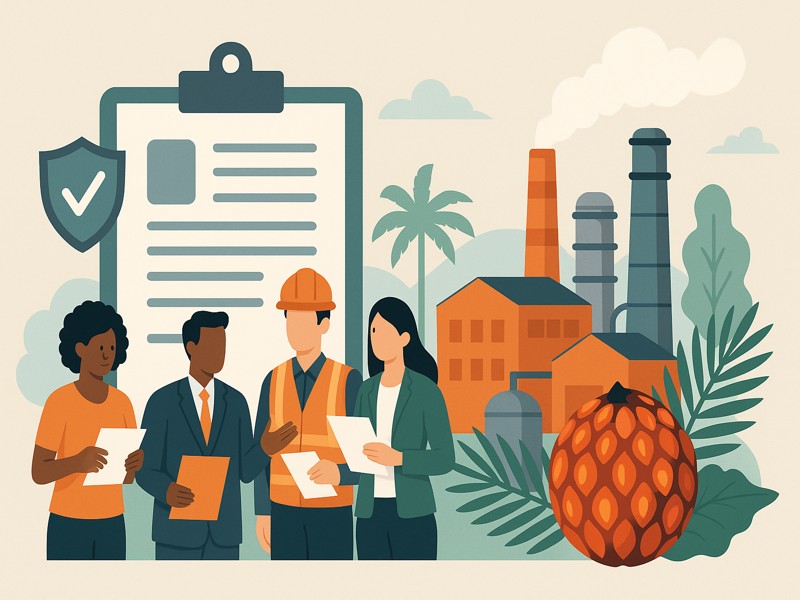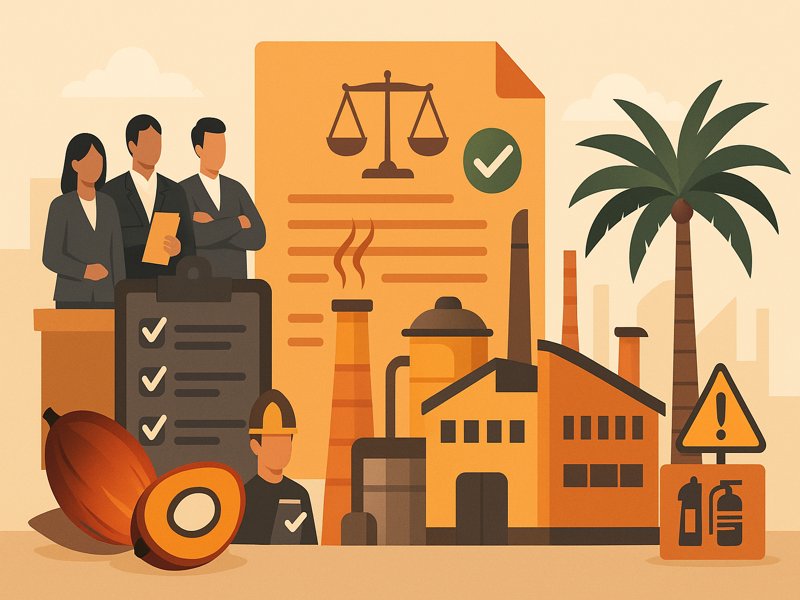Setting up a palm oil processing plant is a major investment, but before the first fresh fruit bunch (FFB) is processed, there is a critical stage that cannot be overlooked—meeting all licensing and regulatory requirements. Palm oil is a globally traded commodity, and its production is subject to strict controls to ensure environmental protection, labor welfare, product quality, and market traceability.
This guide explores the permits, licenses, and regulatory compliance obligations you must understand and fulfill when building and operating a palm oil processing plant, from pre-construction approvals to ongoing operational certifications.
Why Licensing and Regulatory Compliance Matter
Palm oil milling involves multiple regulated activities:
- Agricultural processing (handling perishable crops)
- Industrial operations (boilers, pressure vessels, heavy machinery)
- Food-grade oil production (hygiene and quality control)
- Environmental management (wastewater, emissions, solid waste)
- Labor-intensive industry (worker safety and welfare)
Non-compliance can lead to:
- Project delays during construction.
- Plant shutdowns or loss of export licenses.
- Fines, penalties, and legal disputes.
- Reputational damage affecting buyer confidence.
Early engagement with regulatory authorities ensures smoother project approval and faster commissioning.
Pre-Feasibility and Land-Use Approvals
Before construction begins, confirm that the proposed site is legally and technically suitable for a palm oil mill.
Land-Use and Zoning Approvals
- Zoning compliance: The site must be zoned for industrial or agro-industrial use.
- Conversion permits: Agricultural land may require conversion to industrial status.
- Local authority consent: Municipal or district councils often require site plan submission and review.
Environmental Impact Assessment (EIA)
Mandatory in most producing countries for mills above a certain capacity (e.g., >10 t/h FFB).
Includes assessments of:
- Land clearing impacts.
- Water use and wastewater discharge.
- Air emissions from boilers.
- Traffic impact from FFB deliveries.
The EIA process usually involves:
- Scoping and terms of reference.
- Baseline environmental data collection.
- Public consultation with nearby communities.
- Submission and review by the environmental authority.
- Approval with conditions (e.g., mitigation measures).
Construction-Phase Permits
Once land and EIA approvals are secured, specific construction-related licenses must be obtained.
Building Plan Approval
- Submitted to local authorities for review by engineering and safety departments.
- Includes layout drawings, structural calculations, and fire safety provisions.
Factory Construction Permit
- Issued under the National Factories and Machinery Acts or equivalent.
- Confirms compliance with industrial safety standards, including structural strength for heavy machinery loads.
Boiler and Pressure Vessel Installation Approval
- Boilers, sterilizers, and steam tanks must comply with pressure vessel regulations (e.g., ASME, EN, or local code).
- Design drawings, material certificates, and third-party inspection reports are typically required.
Operational Licensing Before Start-Up
With construction complete, a new set of licenses is needed to operate legally.
Factory Operation License
Authorizes the plant to operate as a manufacturing facility.
Often requires submission of:
- Safety management plan.
- Workplace health and safety procedures.
- Emergency response plan.
Food Production and Processing License
Since crude palm oil is a food commodity, mills must comply with food hygiene laws.
Authorities may inspect:
- Sanitary conditions of processing areas.
- Pest control programs.
- Product handling and storage procedures.
Boiler Operation Certificate
- Each steam boiler must pass hydrostatic tests and operational checks.
- Licensed boiler operators are mandatory in many countries.
Pressure Vessel Certificates
Sterilizers and storage tanks must be tested for pressure integrity and safety relief devices.
Environmental Compliance Requirements
Palm oil processing generates significant by-products and emissions. Environmental permits address:
Palm Oil Mill Effluent (POME) Discharge Permit
Regulates the quality and quantity of wastewater discharged.
Key parameters monitored:
- Biochemical Oxygen Demand (BOD)
- Chemical Oxygen Demand (COD)
- Suspended Solids (SS)
- Oil and grease content
Many mills must install anaerobic ponds, digesters, or biogas capture systems.
Air Emission Permit
- Covers emissions from boilers and sterilizer vents.
- Requires compliance with particulate matter (PM) and NOx/SOx limits.
- Stack sampling and monitoring reports may be mandatory.
Solid Waste Disposal Permit
- Empty fruit bunches (EFB), fibers, and shells may be reused as fuel or mulch.
- Disposal to landfill requires prior approval.
Labor and Occupational Safety Regulations
Palm oil mills are high-risk workplaces due to heavy machinery, hot steam, and manual handling.
Worker Safety Compliance
- Machine guarding and safe operating procedures.
- Personal protective equipment (PPE) provision and training.
- Confined space entry protocols for sterilizers and tanks.
Labor Law Compliance
- Fair wages, legal working hours, and social security contributions.
- No use of forced or child labor (especially important for export market compliance).
Occupational Health Inspections
- Periodic inspections by labor departments.
- On-site medical facilities may be required for larger plants.
Export Certification and Quality Standards
If the CPO or kernels are sold internationally, further certifications may be required.
RSPO (Roundtable on Sustainable Palm Oil) Certification
Voluntary but widely demanded by international buyers.
Covers:
- Sustainable sourcing from plantations.
- Traceability systems.
- Environmental and social responsibility.
ISCC (International Sustainability and Carbon Certification)
- Recognized in EU biofuel markets.
- Focuses on greenhouse gas (GHG) reduction and sustainable supply chains.
HACCP and ISO 22000
- Food safety management systems.
- May be required for refined oil production or specialty markets.

Fire Safety and Emergency Preparedness
Fire Department Approval
- Design review for hydrants, sprinklers, and fire pumps.
- Fire drills and emergency evacuation plans.
Hazardous Material Storage Permit
Diesel, lubricants, and chemicals for water treatment must be stored according to safety codes.
Ongoing Compliance and Renewals
Licensing is not a one-time exercise. Most permits require periodic renewal.
- Annual environmental monitoring reports.
- Quarterly or yearly boiler inspections.
- Regular occupational safety audits.
- Certification body surveillance audits for RSPO/ISCC.
Failure to maintain renewals can result in license suspension.
Penalties for Non-Compliance
Penalties vary by jurisdiction but may include:
- Heavy fines.
- Closure orders.
- Revocation of export rights.
- Criminal liability for serious safety or environmental breaches.
Best Practices for Smooth Regulatory Approval
- Engage consultants with experience in palm oil mill licensing.
- Start early—some permits take 6–12 months for approval.
- Maintain transparent communication with authorities.
- Document everything—keep copies of approvals, test reports, and inspection records.
- Integrate compliance into design—don’t retrofit environmental controls later.
Typical Licensing Timeline for a New Palm Oil Mill
| Stage | Main Licenses & Approvals | Typical Duration |
| Pre-construction | Land-use approval, EIA | 4–8 months |
| Construction start | Building plan approval, construction permit | 2–4 months |
| Mid-construction | Boiler/pressure vessel installation approval | 1–3 months |
| Pre-operation | Factory operation license, food processing license, and environmental permits | 3–6 months |
| Ongoing | Renewals, audits, and environmental monitoring | Continuous |
Country-Specific Variations
While core requirements are similar, details vary:
- Malaysia: DOE (Department of Environment) for EIA, DOSH (Department of Occupational Safety and Health) for machinery and boilers.
- Indonesia: AMDAL environmental approval, Industrial Business License (IUI), and labor inspections.
- Nigeria: State environmental agency approvals and national food regulatory body licensing.
- Colombia: Ministry of Environment permits for effluent and emissions.
By aligning plant design and operations with regulatory requirements from the outset, you not only avoid costly delays and penalties but also build a foundation of trust with buyers, communities, and stakeholders. A legally compliant, certified, and sustainably operated mill is not just a legal requirement, but also a competitive advantage in the cutthroat palm oil market.


